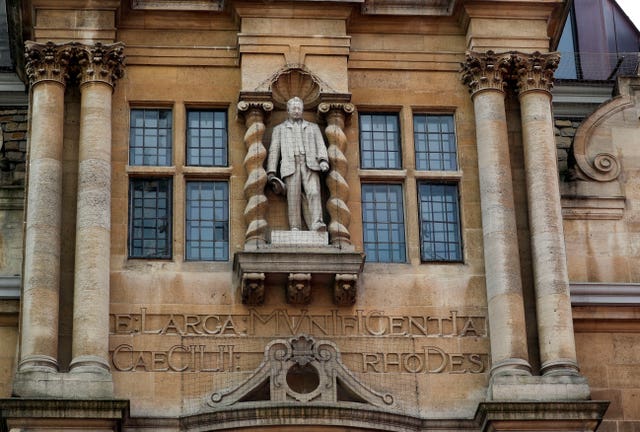
Universities must decolonise education by broadening their teaching to take into account a wider spectrum of views beyond a euro-centric approach in order to tackle a “silent crisis” on campuses, a report says.
Institutions need to tackle discrimination, hostility and unconscious bias against staff and students campaigning for decolonisation, a paper published by the Higher Education Policy Institute (Hepi) says.
The Government and universities should boost funding for black, Asian and minority ethnic (BAME) scholarships and research to address a “dearth” of research work on decolonisation, the report suggests.
It argues the decolonisation of British universities is “vital” for the improvement of course curricula, staff wellbeing and the student experience, and adds that the current state of affairs is “unacceptable”.
“Students of colour feel silenced within institutions and are concerned about unconscious bias in marking,” the report warns.
Respondents said they have experienced “overt and covert discrimination” because of their decolonisation work, and some academics have feared job insecurity because of their work on the topic.
The paper comes as the movement to decolonise higher education has gained momentum in recent months following global anti-racism protests. They were sparked by the death of George Floyd, who died in Minneapolis in May after a white police officer placed his knee on his neck for almost nine minutes.
Since then, a number of British universities have tried to distance themselves from historical figures with links to the slave trade – and Oriel College at the University of Oxford “expressed their wish” to remove the statue of imperialist Cecil Rhodes from outside the college following demonstrations.
The paper, by Mia Liyanage, a Masters student at the University of Oxford, is based on more than 20 hours of interviews with leading figures in academia, student activism and higher education policy.
The report concludes that Oriel College’s plan to remove Rhodes’ statue is “a symbolic victory for the movement to decolonise universities”, but is “only the first step towards meaningful change”.

Respondents testified that “a hostile environment exists for people of colour” in their institutions. Beth Davies-Kumadiro, a University of Oxford graduate, described her old college as “a space of horror for people” especially when there were so few black students in each college.
Universities should avoid “inadvertently implementing biased or tokenistic policies” to address decolonisation and they must engage with experts on unconscious bias and “interrogate” their harassment procedures and marking criteria along these lines, the report says.
Ms Liayanage makes a number of recommendations, including calling for departments to hire staff to work specifically on issues relating to anti-racism and decolonisation of their department.
Respondents said decolonised British-specific Black Studies should be introduced at universities
In the conclusion of the report, Ms Liyanage writes: “For too long, fuelled by anxiety, ignorance and unfounded prejudice, the UK higher education sector has refused to engage sufficiently with decolonisation or its proponents, even when they come from an institution’s own staff or student body.
“The testimony collated in this paper shows a silent crisis is going on in our institutions: a crisis of student and staff wellbeing; of course rigour; and of academic expression. Innovative ideas are not being heard, and UK universities are lagging behind as a result.”
In the foreword to the report, Professor Iyiola Solanke, professor of EU law and social justice at University of Leeds and founder of the Black Female Professors Forum, said: “An outdated euro-centrism, that no longer reflects the world in which graduates will live and work, must not be allowed to dominate in our classrooms or in the country.”
Jo Grady, general secretary of the University and College Union, said: “Universities need to do more than pay lip service to tackling the structural inequality that stretches across our education system.
“This report demonstrates that there is much work to do to decolonise our institutions, and that this needs to be a responsibility shared by staff at all levels.”
A spokeswoman for Universities UK said: “We encourage universities to engage further with BAME students to better understand the impact that current teaching and learning practices, including curriculums, can have on the wider student experience, their sense of belonging and degree outcomes.
“Many are already developing a more inclusive programme of learning, which includes – but should not be limited to – reviewing their curriculums.”
Michelle Donelan, universities minister, said: “No-one should seek to infringe upon the academic freedom of educators to assign the texts they consider the most appropriate for a rigorous and high quality education.
Students deserve the opportunity to study a wide and diverse range of topics at university and learn about how Britain became the nation it is today. It is also vital that we do not seek to censor or edit our past but instead remember and learn from it.”


Comments: Our rules
We want our comments to be a lively and valuable part of our community - a place where readers can debate and engage with the most important local issues. The ability to comment on our stories is a privilege, not a right, however, and that privilege may be withdrawn if it is abused or misused.
Please report any comments that break our rules.
Read the rules hereLast Updated:
Report this comment Cancel